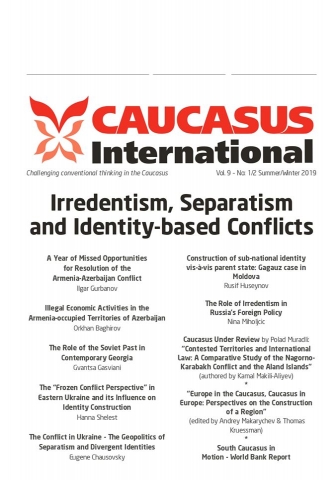The current issue is dedicated to the dynamics of the protracted, frozen and boiling territorial and identity-based conflicts and the repercussions of the aggressive separatism in Eurasia, precisely in the former Soviet area. The current authors of the CI Journal analyzed the political narratives, identity and memory policies of the states, the national identity and the identity construction of the ethnic minorities, the geopolitical aspects of the conflicts, a threat of territorial expansions and factor of irredentism in the foreign policy, the illegal economic activities in the gray zones (occupied territories) and the process of negotiations for the settlement of the unresolved conflicts. While analyzing these topics, the authors also reflected their views on the challenges of these factors for the domestic and foreign policies of the states and as well as for the stability of the regions where these conflicts anchored in.
The free PDF articles from the issue can be downloaded at the CI's website via the following link:https://cij.az/new-issue.html
The full version of the Journal can be accessed here:https://cij.az/web/uploads//images/Journals/Coverpages/Vol-9-No-1-2-Summer-Winter-2019.pdf
The previous issues of the CI journal can also be accessed at:https://cij.az/archive.html
Caucasus International (CI) is a Baku-based semi-academic journal on foreign policy and is published on a biannually basis since 2012. It seeks to present a global and regional perspective on issues affecting the Caucasus neighborhood and focuses largely at the role of the region in international contexts and policymaking. The journal includes perspectives from policymakers, area specialists, political activists, and diplomatic professionals along with academics of different countries and backgrounds. Caucasus International is published by the Center of Analysis of International Relations (AIR Center).




